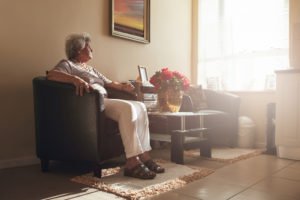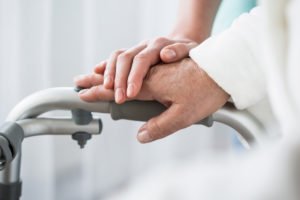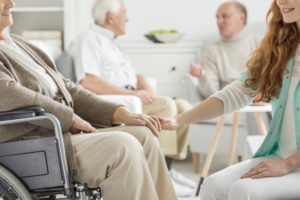
Roughly, one in 10 adults above the age of 65 experiences elder abuse, according to the National Council on Aging (NCOA). However, many of these crimes go unreported, so the rate of abuse in nursing homes could be much higher.
According to a National Public Radio (NPR) report, even in cases where neglect and abuse are severe enough to require medical attention or emergency treatment, people did not report incidents to law enforcement agencies.
Abuse can have a range of detrimental health effects on a senior and cause physical as well as psychological harm. The World Health Organization (WHO) highlights a study that found that seniors subjected to abuse are almost two times as likely to die prematurely as those who do not suffer from abuse.
Nursing home abuse is illegal. If your loved one is suffering from any injuries resulting from abuse, you can get in touch the office of a Sunrise nursing home abuse lawyer for help as soon as possible. We are passionate about fighting elder abuse. You and your loved one may have legal recourse and could receive compensation. Call Ben Crump Law, PLLC, now for your free case review at 800-959-1444.
Types of Nursing Home Abuse
Moving your loved one into a nursing home can be a tough and stressful decision. However, you do so with the expectation that professionals will administer the appropriate care to them and have their best interests at heart.
A nursing home can be the best decision for keeping them safe and secure, especially when a senior has dementia or another cognitive condition. However, sometimes a nursing home fails to keep seniors safe and may be responsible for harming a resident.
Types of nursing home abuse can include, among others:
Physical Abuse
Physical abuse is perhaps the most easily identified type of abuse, as it will leave injuries and marks on the senior’s body. Physical abuse can be any intentional use of force that results in injuries. Physical abuse includes inappropriate restraining, inappropriate use of drugs, and physically assaulting a senior.
Emotional and Verbal Abuse
It can be heartbreaking to find out that your loved one is emotionally abused in their nursing home. Emotional abuse can include making verbal threats or humiliating the senior, as well as ignoring their requests, or keeping them isolated and away from social interaction.
Sexual Abuse
Sexual abuse includes any unwanted sexual acts or sexual contact. Sexual abuse can also include taking photographs of a sexual nature, unwanted nudity, or forcing a senior to watch sexual acts.
General Neglect
General neglect of a senior can be a form of abuse. Neglect can lead to a range of health problems for nursing home residents. If staff neglects to help a senior eat or drink, for example, they can suffer from malnutrition and dehydration, which can cause premature death. Neglecting the daily hygiene and medical needs of a nursing home resident can lead to infections, bedsores, and other diseases.
Financial Abuse
Financial exploitation involves the unauthorized use of a senior’s funds either by exercising undue influence on the elderly person or by theft. While this may not have as much of a consequence on the health of a senior as other types of abuse, it can be upsetting for them and their families.
For a free legal consultation with a nursing home abuse lawyer serving Sunrise, call 800-712-9119
You Could Have Legal Recourse
When a senior enters a skilled nursing facility, both parties usually sign a contract. This contract typically stipulates the care the senior will receive, costs, and other details about the nursing facility. There are also laws that protect seniors from nursing home abuse and neglect. For example, the Nursing Home Reform Act of 1987 explicitly states that a nursing home resident’s rights include being “free from physical or mental abuse.”
If the nursing home is failing to protect your loved one, you may have legal recourse based on your contract with the facility as well as the applicable laws. You could receive compensation for any injuries and financial losses your loved one suffers because of the abuse.
The Responsibility of Nursing Homes
As a general rule, the nursing home is responsible for the property and what happens on the property, no matter whether a member of staff, a visitor, another resident, or a third-party contractor commits abuse. The nursing home must ensure the safety of its residents and to have procedures and policies in place that protect them. The nursing home is also required to adequately staff the facility and hire new staff responsibly.
To have a case, however, you will need to prove that the nursing home has acted negligently. This requires extensive evidence and can sometimes be an uphill battle for the relatives of a senior in nursing care. However, a Sunrise nursing home abuse lawyer can help you prove your case and collect the required evidence. Evidence you might need for your claim can include:
- Medical records
- Photographs of injuries
- Medical bills and receipts
- Witness statements
- Nursing home records
- Expert witness testimony
Sunrise Nursing Home Abuse Lawyer Near Me 800-712-9119
Your Sunrise Nursing Home Abuse Lawyer Can Help
If your loved one is suffering from any type of abuse in their nursing home in Sunrise, you may want to take action against the nursing home. You might be able to recover compensation such as medical treatment costs, hospitalization costs, and other injury-related expenses connected with nursing home abuse.
You could also receive awards for any emotional and physical pain and suffering that your loved one has experienced.
Consulting with a Sunrise nursing home abuse lawyer can help you decide on your best option going forward. We can assist you with filing a claim, including gathering the relevant evidence, negotiating with insurances, and representing you in court.
If someone else is responsible for causing injuries and emotional pain to your loved one, you should not shoulder the expenses. We might be able to help you recover what is due to you and protect you from future costs related to any injuries.
Contact Ben Crump Law, PLLC, at 800-959-1444 today to speak with a team member to find out how we could help you get justice and compensation.
Call or text 800-712-9119 or complete a Free Case Evaluation form








